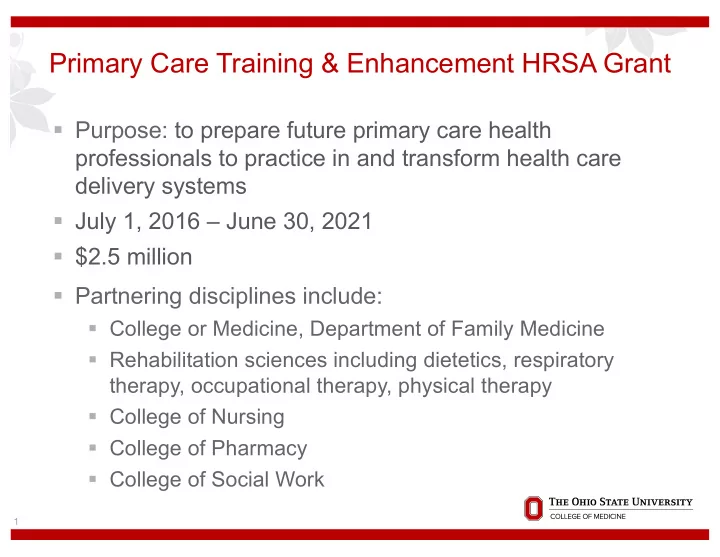

Primary Care Training & Enhancement HRSA Grant § Purpose: to prepare future primary care health professionals to practice in and transform health care delivery systems § July 1, 2016 – June 30, 2021 § $2.5 million § Partnering disciplines include: § College or Medicine, Department of Family Medicine § Rehabilitation sciences including dietetics, respiratory therapy, occupational therapy, physical therapy § College of Nursing § College of Pharmacy § College of Social Work 1
How Are Learners Involved? § Group Projects § Community health education § Year-long service-learning project including medical, nursing, social work, pharmacy and dietetics students § Health coaching § Pairs MD and NP students with a patient volunteer § QI project in an ambulatory care setting § Teams of 4 th year medical students and DNP students work on a year-long QI project at a family medicine clinic § Hotspotting § Interprofessional students from medicine, nursing, social work, dietetics, and pharmacy pair with high utilizer patients 2
How Are Learners Involved (continued) § Experiential Group Practice § Longitudinal clinical experience over the first 18 months of medical school § Includes students from medicine, nursing, social work, pharmacy, and dietetics § Immigration health clinic experience during 3 rd year clerkship § Led by FM residents and includes 3 rd year medical students, nursing, social work, pharmacy and dietetics students § 4 th year ambulatory care rotation § Pairs 4 th year medical students with senior NP students for one block rotation 3
How Are Learners Involved (continued) § Leadership Training § Small-group sessions with primary care interested 1 st and 2 nd year medical students § Residency didactics § Interprofessional elective course offered to 1 st and 2 nd year medical students § Includes students from medicine, pharmacy, social work, dietetics, and physical therapy 4
What Are Students Saying? § “It has given me a much more in depth understanding of the roles of physicians and how they collaborate with NP’s. It has also given me a unique experience of working with a medical student.” § “This experience taught me to think about myself as a part of an interprofessional team and to view my role in healthcare as a part of a robust team in which every member/profession is needed.” § “Working with other disciplines can be challenging for scheduling as well as communicating and also difficult considering we have completely different specialties.” § “I enjoyed the interprofessional session on the social determinants of health. This broadened my scope of understanding of others' professions as well as provided a fun activity to work together and discuss the social determinants of health from different perspectives. It was helpful to be interactive.” 5
Challenges Implementing Interprofessional Education § Scheduling between disciplines and colleges § Academic calendars vary between the college of medicine and university calendar § Matching level of learner § Appropriately pairing medical students with undergraduate, graduate and doctorate-level students § Awarding credit for classes, projects & clinical time § Each major has different curriculum requirements for awarding independent study, clinical hours and/or elective credit § Commitment § Recruiting students & faculty to participate § Developing specialized certificate to combat this challenge § Technology § Organizing learning materials across different learning management systems used in each discipline 6
Recommend
More recommend